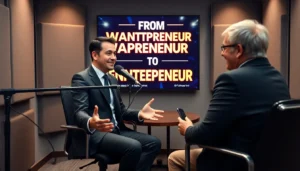Ever sat through a work meeting, staring at the clock, wondering if your career is stuck in a never-ending loop? You’re far from alone. Luckily, career development books are like roadmaps guiding you through the maze of professional growth. They help navigate the often confounding terrain of skills, networking, and personal branding. Whether you’re plotting your next big leap or just trying to get off the couch, this guide dives deep into the world of career development literature. Let’s unwrap the insights these books offer and how they can boost your professional journey.
Table of Contents
ToggleThe Importance Of Career Development

In today’s fast-paced world, staying stagnant is not an option. Career development is essential for anyone who has aspirations beyond their current position. Proactively engaging in career development isn’t just about searching for new jobs: it’s about enhancing existing skills, broadening knowledge, and aligning personal values with professional goals.
Consider this: without a map, how can anyone hope to reach their destination? Career development provides that essential navigation aid. It empowers individuals to clearly understand their passions and align them with potential job opportunities. Not only does it foster personal growth, but it also equips professionals with the competencies needed to adapt to changing job markets. Employers increasingly look for evidence of continuous self-improvement and adaptability, making career development literature an invaluable resource.
Key Themes In Career Development Literature
Diving into the realm of career development books reveals several recurring themes. Each book contributes its unique perspective but often revolves around a few core ideas:
Self-Awareness
Understanding oneself is critical. Many books emphasize the need for self-reflection, helping readers identify their strengths, weaknesses, and passions.
Skill Development
A significant focus is placed on feedback loops. Enhancing skills through practice and recalibration is a frequent recommendation.
Networking
Building genuine relationships is vital. Many authors highlight the power of professional networks and how they play a critical role in career advancement.
Lifelong Learning
Continuous education is emphasized. The most successful professionals are often those who adore learning new things, whether through formal education or self-study.
Goal Setting
Setting achievable, measurable goals is essential. This not only provides direction but also creates motivation. Books often stress the importance of reviewing and adjusting goals regularly.
Top Career Development Books To Consider
Now, let’s get to the fun part, recommendations. Here are some standout career development books that have gained acclaim:
- “The 7 Habits of Highly Effective People” by Stephen R. Covey
This classic explores how personal and professional effectiveness stems from aligning principles with values. Covey’s insights on proactive behavior are invaluable.
- “Lean In: Women, Work, and the Will to Lead” by Sheryl Sandberg
Sandberg encourages women to embrace leadership roles, detailing the barriers they face in the workplace and providing strategies for overcoming them.
- “Mindset: The New Psychology of Success” by Carol S. Dweck
Dweck’s book uncovers the power of a growth mindset. It enhances the understanding of how our beliefs shape our potential and success.
- “Designing Your Life: How to Build a Well-Lived, Joyful Life” by Bill Burnett and Dave Evans
This book applies design thinking principles to life management, urging readers to view their careers as prototypes to be refined over time.
- “Dare to Lead: Brave Work. Tough Conversations. Whole Hearts.” by Brené Brown
Brown provides insights into how embracing vulnerability is a strength that leads to effective leadership and a positive workplace culture.
Each of these selections offers unique insights, applicable strategies, and the inspiration needed for a successful career journey.
How To Effectively Choose The Right Career Development Book
With a myriad of options available, choosing the right career development book can be daunting. Here are some tips:
- Identify Your Goals
Before diving into the sea of self-help literature, consider what you want to achieve. Define clear professional goals and look for books that align with them.
- Read Reviews
Reviews and recommendations are like gold nuggets hidden among rocks. Look at platforms like Goodreads or Amazon to see what resonates with others.
- Sample Before Committing
Many online platforms allow readers to preview sections of books. Use this to ensure the writing style and content meet your preferences.
- Consider the Author’s Background
An author’s credentials can significantly impact the book’s credibility. Research their professional background and experiences related to career development.
- Seek Variety
Don’t hesitate to explore different perspectives. Mix books that offer theoretical frameworks with those that propose practical strategies.
By taking a thoughtful approach to selection, readers can find that perfect book to help shape their career journey.
Combining Theory With Practice: Implementing Insights From Books
Understanding the theory is just the beginning. Implementing insights from career development books is crucial for real-world impacts. Here’s how to put those pages into action:
Create a Personal Development Plan
Choose key takeaways from your readings and formulate a structured approach. Write down specific actions, deadlines, and checkpoints to track progress.
Engage in Conversations
Share insights from books with peers or mentors. Discussing ideas not only solidifies understanding but opens the door for different perspectives and practices.
Set Experiential Goals
Implementation goes beyond reading. Identify opportunities for real-world applications, whether through volunteering, internships, or part-time roles that align with your learning.
Reflect and Adjust
Regular reflection on what’s been learned and practiced is vital. Identify what worked and what didn’t, adjusting strategies accordingly. Feedback is key.


